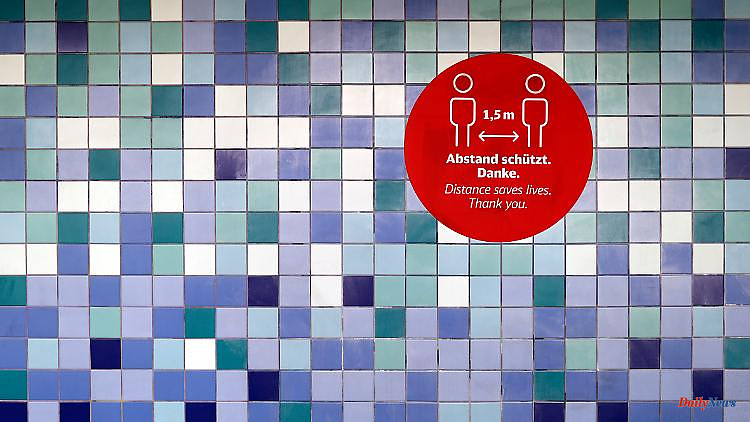Lousy data, unmanageable effects of the measures, frequent tinkering with the legal basis: the report that the expert commission for evaluating the corona measures in politics issues is not good.
Janosch Dahmen was to be right. In the morning, the Greens health expert had still severely dampened expectations of the report by the Corona Expert Committee. "Today I'm more likely to see indications of where further research is required," he said in ntv's "early start".
That's how it was. Anyone who had hoped for clear recommendations for action for politicians or criticism of the previous corona measures was disappointed. There was only one point in which the verdict - scientifically and politely formulated - was devastating: the data situation is horrible even in the third year of the pandemic.
There is no stringent and sufficient data collection, so the commission and society have to deal with it, said the deputy chair of the commission Helga Rübsamen-Schaeff at the presentation of the final report. Economist Christoph M. Schmidt criticized that because the available data was not good enough, politicians had to rely more on modeling than on the evaluation of their measures during the pandemic. "We have poor data," summed up the virologist Hendrik Streeck. Jutta Allmendinger, President of the Social Science Research Center Berlin, said that the report "had to produce unclear results on many points because we don't have the data".
The task of the experts was to examine “the effectiveness of the measures taken on the basis of the regulations mentioned on the basis of epidemiological and medical findings”. However, the experts "did not want to provide a general statement" (Schmidt), but "an informed and solid basis for future measures and strategies" (Rübsamen-Schaeff).
Allmendinger answered a journalist's question as to whether anyone had to apologize for the Corona policy with an implicit yes. She said "that we should already be saying to the cameras that we can do better than we've done in the last two years. And why we can do better, but specifically how we can do better, and that we'll do better too". How it could be done better, however, remained unclear in places.
There had been both political and internal conflicts about the work of the commission, even though Allmendinger emphasized that it was "a great commission". The resignation of the virologist Christian Drosten, who had been nominated by the Union faction, referred to the internal conflicts at the end of April. One of the reasons he left was that there was no epidemiologist on the panel. The CDU/CSU then nominated the virologist and epidemiologist Klaus Stöhr, which was also an expression of their corona political change of course on their way from the government to the opposition: Unlike Drosten, Stöhr warns more of scaremongering than of the next corona wave. According to the "Bild" newspaper, he had wished for a more critical assessment of the measures, but was unable to assert himself in the committee.
In addition to the poor data situation, such lines of conflict could explain why the report of the Committee of Experts sometimes seems a little undecided. With regard to masks, it says: "The epidemiologically measurable effectiveness of face masks is proven by several levels of evidence, but cannot be conclusively assessed, especially with regard to the different evaluations of surgical and FFP2 masks." The recommendation to wear masks is cautiously worded: "Since the transmission of the coronavirus indoors is much stronger than outdoors, a mask requirement should in future be limited to indoor areas and places with a higher risk of infection."
There was a political dispute about the commission because Minister of Justice Marco Buschmann wanted to wait for her report before extending the corona measures. In fact, the FDP politician made the extension more difficult: In the coming week, the Bundestag will meet for the last time before the parliamentary summer break. When the MPs meet again at the beginning of September, there are still two weeks left until the relevant paragraphs in the Infection Protection Act expire.
This is primarily about paragraphs 28a and 28b, which form the legal basis for the nationwide corona protection measures, as the Frankfurt law professor Andrea Kießling, who was also a member of the expert committee as deputy chairwoman, explained on Twitter. Without a timely extension of the law, from September 24th there would only be a legal basis for selective measures in response to individual outbreaks. Precautionary protection would then no longer be possible.
Kießling emphasized that there was no legal obligation to wait for the report of the expert committee. "Due to the time limit, the party that wants little or no action has more leverage, because after all, renegotiations have to be made every few months - if there is no agreement, there is no longer any legal basis."
This approach was highly controversial. The President of the Federation of German Industries (BDI), Siegfried Russwurm, called the current corona policy "disturbing" two weeks ago. It is "not a concept to wait until October". The SPD and the Greens also see it that way, but have bowed to the timetable of the FDP.
Buschmann had recently even questioned the point of masks. He himself wears one when shopping. But regulations must be "evidence-based and proportionate". The "scientific evidence on the sense of compulsory masks and vaccination" is "overwhelming," said World Medical Association Council President Frank Ulrich Montgomery.
Streeck agreed when presenting the report, and the report also contains the reference to the epidemiologically measurable effectiveness of face masks. The problem with such measures, however, is that they only work as well as they are implemented. "Masks work, you have to say that clearly," said Streeck. But it is very important that the citizens participate. This applies to masks as well as to a lockdown. There is no doubt that reducing contacts reduces the number of infections. But lockdowns only work as long as people participate. And the longer a lockdown lasts, the less the rules are observed.
When evaluating measures such as mask requirements, lockdown or school closures, it is not just the poor data situation that is a problem. Streeck pointed out that bundles of measures cannot be calculated afterwards. In other words, even with better processing and better availability of the data, the effect of a specific measure could hardly be viewed in isolation. If, for example, distance requirements and the obligation to wear a mask apply at the same time and the number of infections then falls, it remains unclear what part the respective regulation has in this. To make matters worse, the virus variants are also different.
What was the point of the commission then? There were a number of clear recommendations, particularly in the legal field. Andrea Kießling said it would be better to formulate the corona-specific regulations in such a way that they can also be used for all other pathogens. She also demanded that the legal framework not be constantly changed - during the time that the commission had been working alone, the Infection Protection Act had been changed three times.
As far as concrete recommendations for action are concerned, the benefit of the report remains manageable. For a comparison of FFP2 masks and medical masks, for the purpose of contact person tracking and for the purpose of school closures, the commission recommended in-depth evaluations. The Commission is very critical of school closures in particular. Nevertheless, she did not call for this measure to be ruled out forever. "If all else fails, you may have to consider closing schools again," said Allmendinger. But they would have to be the last resort and also be well prepared.












